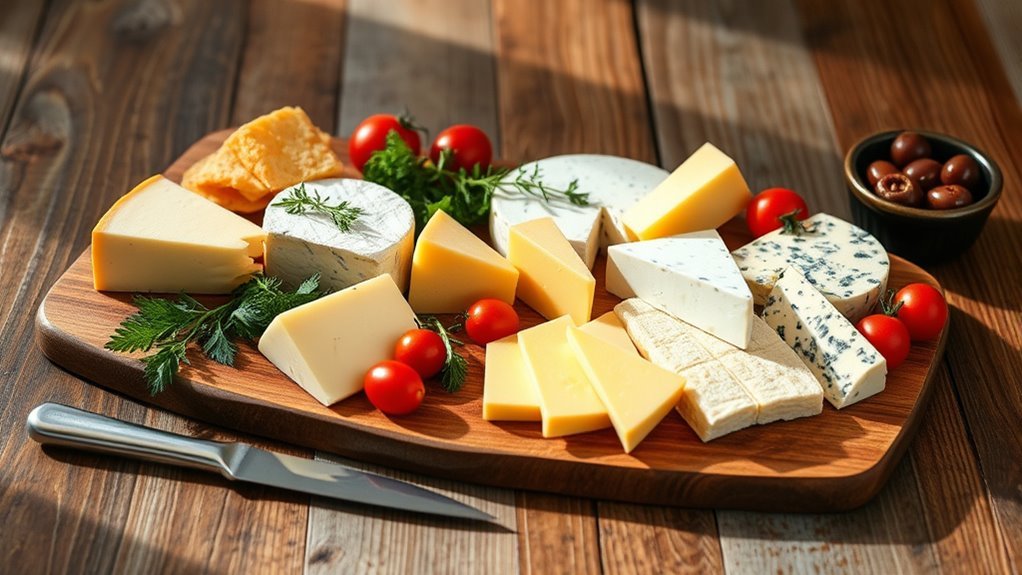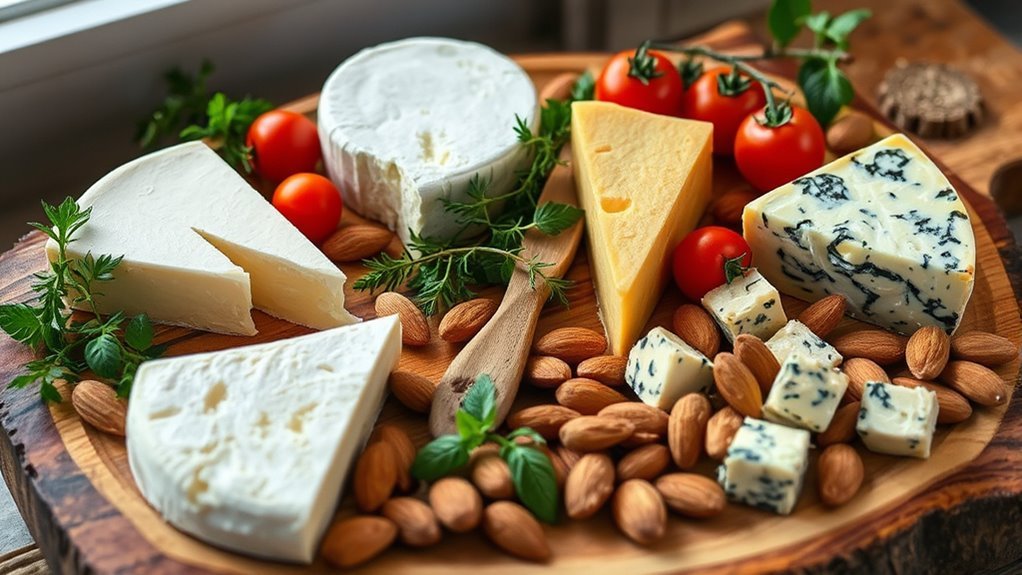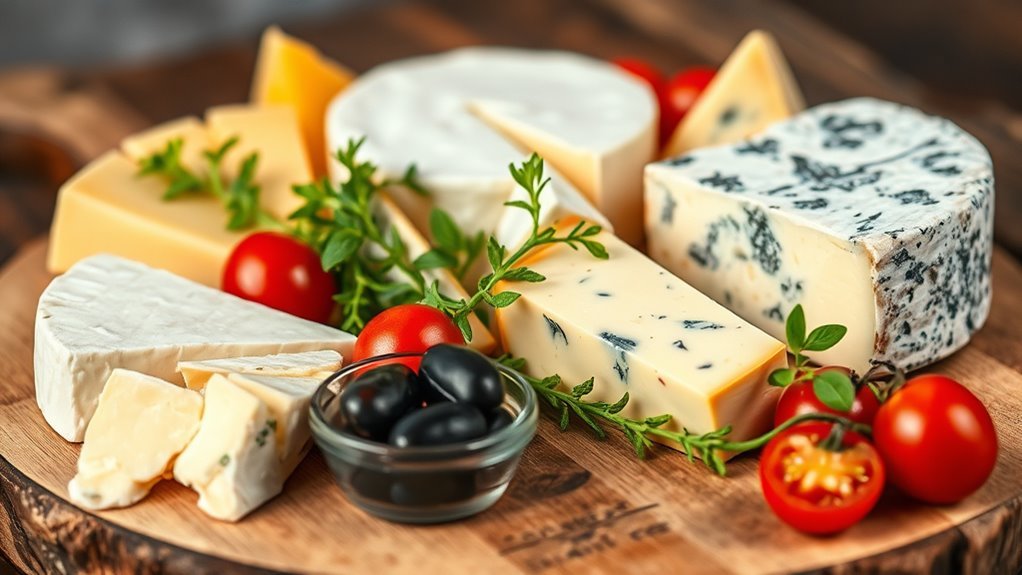Yes, you can eat cheese on a keto diet! Cheese is low in carbs and high in fats, making it a great source of essential nutrients. Varieties like cheddar and mozzarella fit perfectly into your meal plan. However, moderation is key since cheese is calorie-dense. Stick to recommended serving sizes to avoid compromising your progress. There are many creative ways to incorporate cheese into your meals, and you’ll discover even more tips and ideas as you explore further.
The Nutritional Profile of Cheese

Cheese is a staple in many diets, but its nutritional profile makes it particularly appealing for those following a keto regimen. Rich in fats and low in carbohydrates, cheese varieties like cheddar, mozzarella, and goat cheese can fit seamlessly into your meal plan. These options not only provide essential nutrients, but they also offer numerous health benefits. For instance, cheese is a good source of calcium and protein, which are crucial for bone health and muscle maintenance. Additionally, some studies suggest that the fats in cheese may support heart health when consumed in moderation. By incorporating different cheese varieties into your diet, you can enjoy a flavorful experience while reaping the nutrition that aligns with your ketogenic lifestyle.
Best Cheeses for a Keto Diet

When it comes to selecting the best cheeses for a keto diet, there are several top contenders that stand out due to their low carbohydrate content and high fat levels. Varieties like cheddar, mozzarella, and cream cheese are excellent choices, offering rich flavors and versatile uses in your meals. Goat cheese and blue cheese also shine, providing unique tastes while maintaining keto-friendly profiles. These cheese benefits include not only satisfying your cravings but also delivering essential nutrients like calcium and protein. Remember, incorporating different cheese varieties can enhance your dishes while keeping your carb intake low. So, feel free to explore and enjoy these delicious options as you embrace your keto lifestyle!
Portion Control: How Much Cheese Is Too Much?

How much cheese is too much on a keto diet? It’s essential to practice cheese moderation, as excessive intake can hinder your progress. While cheese is low in carbs, it’s high in calories and fat, so understanding serving sizes is vital. Typically, a serving size is about 1 ounce, but you can enjoy a bit more depending on your daily macros.
Here’s a simple guide to help you:
| Cheese Type | Recommended Serving Size | Carb Count (approx.) |
|---|---|---|
| Cheddar | 1 oz | 0.4g |
| Mozzarella | 1 oz | 0.6g |
| Cream Cheese | 1 oz | 1g |
| Parmesan | 1 oz | 0.9g |
Keep these portions in check to maintain your keto lifestyle!
Creative Ways to Incorporate Cheese Into Your Meals
Incorporating cheese into your meals can enhance both flavor and texture, making it a versatile ingredient on a keto diet. Here are some creative ways to enjoy cheese while maintaining your low-carb lifestyle:
Incorporating cheese into your meals enhances flavor and texture, making it a versatile keto-friendly ingredient.
- Cheese sauces: Whip up a rich cheese sauce using cream and your favorite cheese for drizzling over veggies.
- Cheese snacks: Opt for cheese crisps or sticks for a satisfying, low-carb snack.
- Cheese toppings: Sprinkle shredded cheese on salads, omelets, or keto-friendly pizzas for added flavor.
- Cheese blends: Experiment with different cheese blends to elevate your dishes, like mixing mozzarella and parmesan.
- Stuffed dishes: Use cheese to stuff meats or vegetables, creating hearty and flavorful meals.
These ideas will help you enjoy the deliciousness of cheese while staying true to your keto goals.
Potential Pitfalls: What to Watch Out for With Cheese on Keto
While cheese can be a delicious addition to a keto diet, it’s important to be mindful of certain pitfalls that can derail your progress. First, not all cheese varieties are created equal; some contain higher carbs than others, so it’s essential to check labels. Soft cheeses, for example, may have different carb counts compared to hard cheeses. Additionally, if you’re lactose intolerant, consuming cheese can lead to digestive discomfort, potentially undermining your dietary goals. Opt for aged cheeses, which typically contain less lactose. Finally, it’s easy to overindulge, so keep portions in check to maintain a proper balance in your meals. By being aware of these factors, you can enjoy cheese while staying true to your keto lifestyle.
1. Can I eat cheese on a keto diet?
Yes, cheese can be a great addition to a keto diet. Most cheeses are low in carbohydrates and high in fat, which aligns perfectly with the macronutrient goals of the ketogenic diet. Common options that are keto-friendly include cheddar, mozzarella, cream cheese, and goat cheese. However, it’s important to consume cheese in moderation and to choose varieties that are less processed for the best health benefits.
2. What types of cheese are best for a keto diet?
The best types of cheese for a keto diet are those that are low in carbs and high in fat. Some excellent options include:
- Cheddar
- Mozzarella
- Parmesan
- Blue cheese
- Brie
- Cream cheese
- Goat cheese
These cheeses not only fit within the carb limits of keto but also provide essential nutrients and healthy fats.
3. Can eating cheese stall my weight loss on keto?
While cheese can be keto-friendly, it is also calorie-dense and can contribute to weight gain if consumed in excess. For some individuals, high dairy consumption may lead to overeating or trigger cravings. It’s essential to monitor portion sizes and consider how cheese fits into your overall daily macronutrient goals. If you notice weight loss stalls, you may want to reduce cheese intake and focus more on non-dairy fat sources.
4. Are there any health concerns associated with eating cheese on keto?
Some individuals may experience digestive issues or lactose intolerance when consuming cheese, particularly with certain varieties. Additionally, because cheese is high in saturated fat and sodium, excessive consumption could lead to cardiovascular concerns for some people. It’s advisable to opt for high-quality cheeses and balance your diet with plenty of vegetables and other healthy fats to ensure a well-rounded nutrient intake.
5. How can I incorporate cheese into my keto meals?
There are numerous delicious ways to incorporate cheese into your keto meals. Here are a few ideas:
- Use shredded cheese as a topping for salads or casseroles.
- Add cream cheese to smoothies for a creamy texture.
- Make cheese-based sauces for vegetables or meats.
- Use cheese in omelets or frittatas for breakfast.
- Enjoy cheese as a snack with nuts or olives.
Experimenting with different cheeses and recipes can help keep your meals exciting while adhering to your keto lifestyle.
References
- https://www.healthline.com/nutrition/cheese-keto-diet
- https://www.medicalnewstoday.com/articles/cheese-keto-diet
- https://www.ncbi.nlm.nih.gov/pmc/articles/PMC7072276/
- https://www.ncbi.nlm.nih.gov/pmc/articles/PMC6313445/
- https://www.washingtonpost.com/food/2020/01/08/keto-diet-cheese/
- https://www.verywellfit.com/can-you-eat-cheese-on-keto-5193933
- https://www.ketogenic.com/what-to-eat-on-the-keto-diet/cheese-on-keto/


